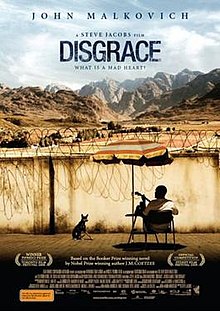Disgrace (film)
| Disgrace | |
|---|---|

Theatrical film poster
|
|
| Directed by | Steve Jacobs |
| Produced by | Steve Jacobs Anna Maria Monticelli Emile Sherman |
| Screenplay by | Anna Maria Monticelli |
| Based on |
Disgrace by J. M. Coetzee |
| Starring |
John Malkovich Jessica Haines Eriq Ebouaney |
| Music by | Antony Partos |
| Cinematography | Steve Arnold |
| Edited by | Alexandre de Franceschi |
|
Release date
|
|
|
Running time
|
120 minutes |
| Country | Australia |
| Language | English Afrikaans Zulu Xhosa |
| Box office | $2.1 million |
Disgrace is a 2008 Australian film based on J. M. Coetzee's novel of the same name. It was adapted for the screen by Anna Maria Monticelli and directed by her husband Steve Jacobs. Starring American actor John Malkovich and South African newcomer Jessica Haines, it tells the story of a South African university professor in the post-apartheid era who moves to his daughter's Eastern Cape farm when his affair with a student costs him his position. It received generally positive reviews.
David Lurie (John Malkovich) is an ageing white professor teaching Romantic literature at an unnamed university in Cape Town shortly after the end of apartheid. David has an affair with one of his students, Melanie Isaacs (Antoinette Engel). University officials learn of the incident and bring David before a disciplinary board. David's colleagues offer him a quiet exit to save face, but he brashly affirms his guilt and refuses to admit wrongdoing, forcing the board to punish him more harshly.
David takes refuge with his daughter, Lucy (Jessica Haines), who owns a farm in the Eastern Cape. At first the two experience harmony and Lurie finds peace with himself, though he grows suspicious of Lucy's farm manager, Petrus (Eriq Ebouaney). One day, David and Lucy are attacked by three men, who rape Lucy. David goes through a crisis, not knowing how to cope with his personal and family tragedies. He is also confused by the newfound guilt he suddenly feels about these rapes. In a movement toward penance, David goes back to his former student's home to beg for forgiveness from her and her family.
The film premiered at the 2008 Toronto International Film Festival, where it was awarded the Prize of the International Critics.
It received generally positive reviews in the media. For example The Washington Post concluded that "Like the novel, the film goes where it must, not where the dictates of off-the-rack narrative compel it. Jacobs has made some smart choices, including tucking the novel's last scene into the body of the film, lessening its inevitable bathos if taken straight from page to screen. The anguishing confrontations between David and Lucy, David and the family of the woman he has wronged, David and Lucy's neighbors, and ultimately, between David and the reality of a modern South Africa, are as powerful here as in the book."
...
Wikipedia
